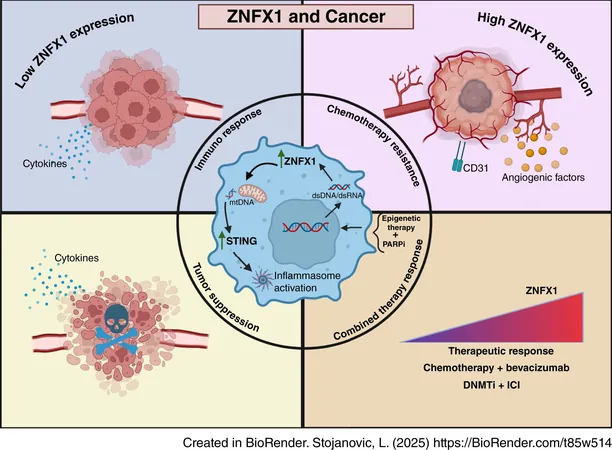
Unlocking New Hope: How a "Master Regulator" Gene Could Revolutionize Ovarian Cancer Treatment!
2025-04-03
Author: Ming
Introduction
In a groundbreaking study co-led by the University of Maryland School of Medicine (UMSOM), scientists have unveiled a pioneering "master regulator" gene known as ZNFX1. This discovery holds the potential to revolutionize treatment strategies for patients battling therapy-resistant ovarian cancer. The findings were recently published in the esteemed journal, Cancer Research.
Research Collaborations and Findings
A collaborative research effort involving UMSOM, Indiana University School of Medicine-Bloomington, and Johns Hopkins University School of Medicine uncovered significant insights from extensive analyses of ovarian cancer patient databases. Researchers discovered that elevated levels of ZNFX1 are closely associated with patient responses to specific therapies in advanced stage ovarian cancer, suggesting its promise as a predictor of treatment outcomes.
Correlation with Survival Rates
Notably, the study revealed that higher expressions of ZNFX1 correlate with improved overall survival rates among patients who participated in a previous phase three clinical trial. In this trial, participants received bevacizumab alongside conventional chemotherapy, pointing towards ZNFX1's potential as a crucial biomarker in personalized treatment approaches.
Implications of Novel Cancer Drugs
Excitingly, the research also identified that two novel cancer drugs—DNA methyltransferase inhibitors (DNMTi) and PARP inhibitors—not only promote the expression of ZNFX1 but also enhance therapeutic responses by triggering tumor-suppressing inflammatory reactions within cancer cells.
Expert Insight
Senior author, Dr. Feyruz V. Rassool, a prominent figure in radiation oncology at UMSOM and co-director of the experimental therapeutics program at the University of Maryland Marlene and Stewart Greenebaum Comprehensive Cancer Center (UMGCCC), emphasized the transformative implications of these findings. "ZNFX1 may serve as a biomarker to facilitate more personalized therapy in ovarian cancer patients," he asserted, highlighting the research's potential to pave the way for innovative treatment modalities.
Conclusion
This groundbreaking exploration adds to previous efforts to harness the capabilities of DNMTi and PARP inhibitors for treating various cancer types, positioning ZNFX1 at the forefront of future clinical trials. As the scientific community continues to delve deeper into this promising avenue, the potential for more effective and tailored interventions offers renewed hope for those afflicted by this challenging disease.
Stay Updated
Stay tuned for more updates on how such innovations could reshape the landscape of cancer treatment!


 Brasil (PT)
Brasil (PT)
 Canada (EN)
Canada (EN)
 Chile (ES)
Chile (ES)
 Česko (CS)
Česko (CS)
 대한민국 (KO)
대한민국 (KO)
 España (ES)
España (ES)
 France (FR)
France (FR)
 Hong Kong (EN)
Hong Kong (EN)
 Italia (IT)
Italia (IT)
 日本 (JA)
日本 (JA)
 Magyarország (HU)
Magyarország (HU)
 Norge (NO)
Norge (NO)
 Polska (PL)
Polska (PL)
 Schweiz (DE)
Schweiz (DE)
 Singapore (EN)
Singapore (EN)
 Sverige (SV)
Sverige (SV)
 Suomi (FI)
Suomi (FI)
 Türkiye (TR)
Türkiye (TR)
 الإمارات العربية المتحدة (AR)
الإمارات العربية المتحدة (AR)